Days late. Dollars short.
Manhattan's 96th Street will get a dedicated bus lane on both sides of Central Park as the Adams administration rolls out last-minute transit and streetscape improvements for congestion pricing — but some residents are wondering why the project isn't bolder.
DOT officials briefed the transportation committees of Manhattan Community Boards 7, 8 and 11 via Zoom in recent weeks on its plan for an offset bus lane between West End and Second avenues to speed up the M96 and M106 buses.
But at two community board presentations, DOT was asked why it wasn't pursuing a car-free busway redesign on the corridor — and why it won't even build concrete bus islands to allow buses to receive and discharge passengers without having to pull over to the curb at stops.
DOT's project manager Leora Nevins more or less said it was too late to make such improvements before congestion pricing kicks in on June 30 — even though the city has known that the tolls were coming since they passed the state legislature in 2019.
"[A busway and bus islands are] not something that we can do in-house with this current program," Nevins told CB7 members on Tuesday. "It's something that we have in mind and could consider for a capital project in the future, but it's not in the scope of this current work."
She also said an offset bus lane — which is designed to discourage double-parking — is best for 96th Street.
"The reality of 96th street is that it is sandwiched between two highways," she said. "Every corridor is different, and offset bus lanes are probably a better way of balancing the different needs on the corridor as opposed to restricting all car traffic."
Here's the plan
The M96 and M106 both go crosstown between the Upper West Side and Madison Avenue, where the M106 heads uptown and the M96 keeps going east to First Avenue. Riders take almost 15,000 bus trips each day on the two lines, which slow to less than 4 miles per hour on some blocks thanks to car congestion.
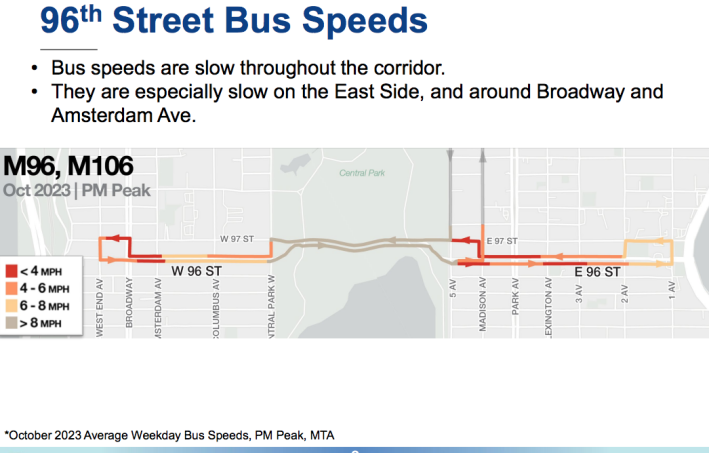
DOT's redesign is relatively straightforward west of Central Park, with offset bus lanes that double in width — or simply shift over — to occupy the curbside lane at some intersections.
The city also wants to ban left turns at Amsterdam Avenue due to what the DOT said was a small amount of drivers even turning left at that intersection. After Columbus Avenue, the bus lane will taper back to the curb to allow for a left turn bay for cars as traffic approaches the 97th Street Transverse.
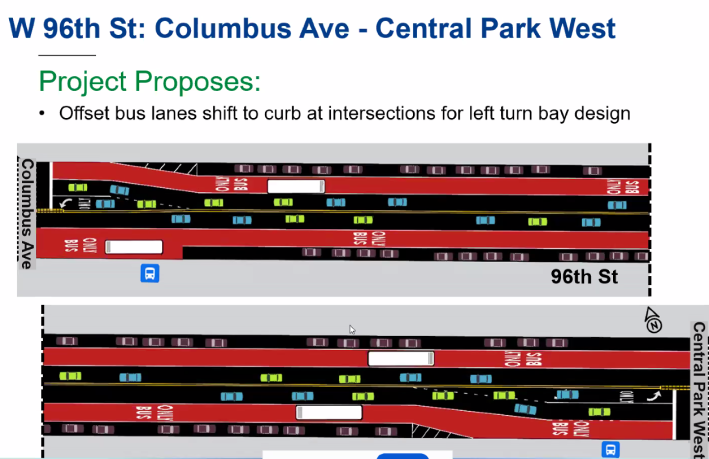
East of the park, the design moves on and off the curb with more frequency. Between Madison Avenue and Park Avenue, the westbound bus lane will stay on the curb to allow for a right-turn lane for drivers at Madison Avenue, while the eastbound bus lane will be an offset lane on the length of the block.
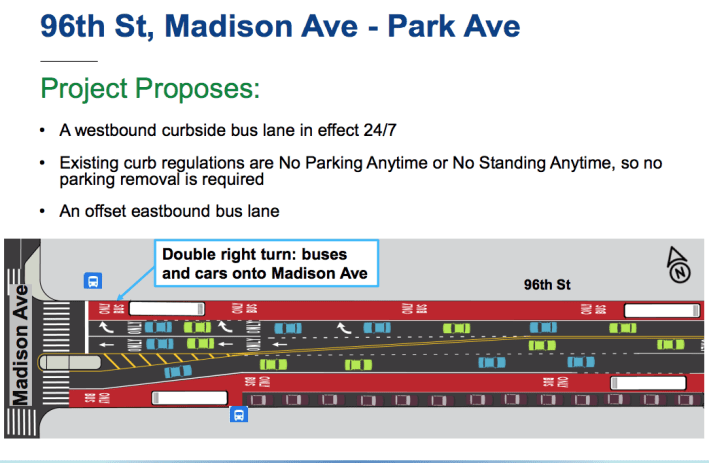
At 96th Street and Park Avenue, the eastbound bus lane will continue as an offset bus lane while the westbound bus lane shifts to curb. DOT will add left-turn bays between the Park Avenue medians, as shown below:
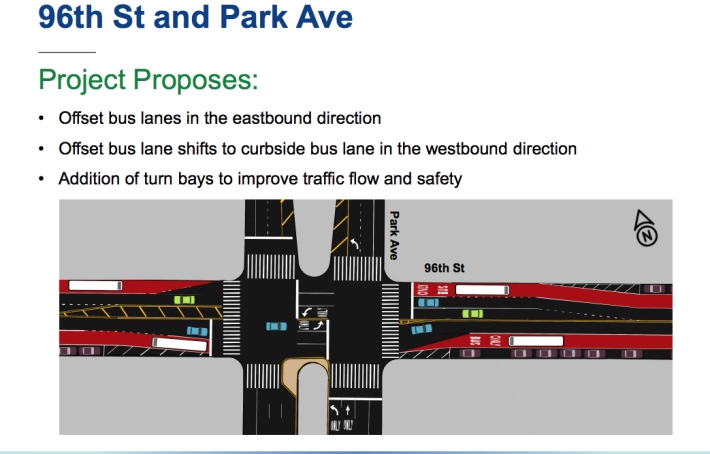
At 96th Street between Lexington Avenue and Third Avenue, the westbound bus lane will be an offset bus lane, while the eastbound bus lane will be a curbside bus lane in effect between 6 a.m. and 8 p.m. — the only piece of the bus lane that won't be in effect for 24/7.
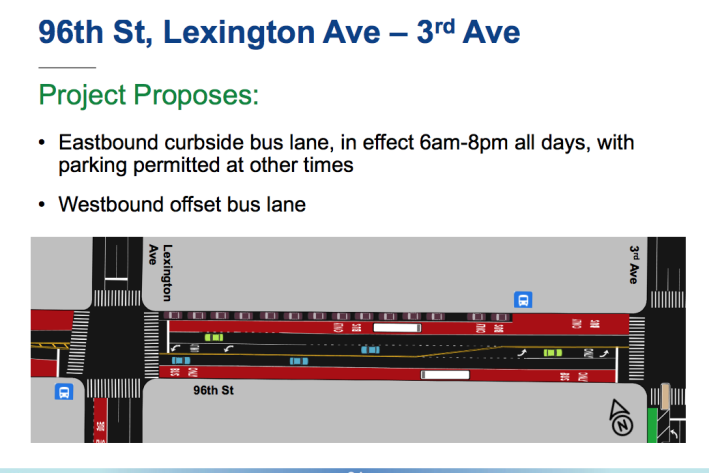
In addition to the bus lanes, the DOT will make a few other small tweaks to move buses along. The agency wants to install queue jumps — a type of traffic signaling that allows buses to get a head start on general traffic — at three locations: 96th Street and Central Park West for eastbound buses, 97th Street and Fifth Avenue for westbound buses, and 96th Street and Third Avenue in both directions.
The DOT plan does not include bus lanes in the 97th Street Transverse. Buses already make good time on the road in the park, agency officials said.
Room for a bike lane
Bus lanes aren't the end of the road for the DOT's work on 96th Street, though. The agency is also studying the area for a potential east-west crosstown protected bike route, Nevins said.
From 2019 to 2023, there were 1,011 reported crashes between West End Avenue and First Avenue — causing 319 injuries and killed four pedestrians and one cyclist.
The 2019 death of cyclist Dr. Daniel Cammerman on the 97th Street Transverse revived calls for the city to finally build safe crosstown bike routes through the park. Cyclists have scant choices available to them in the area besides the highway-like transverses.
With the expected quick work for the bus lane, one attendee of of the presentations told the DOT not to forget about the years-long demand to make it safe to cross Central Park by bike.
"I would like to urge you, don't put the east-west bike lanes in storage," longtime safe streets activist Hindy Schachter told the DOT during the May 1 presentation to the CB 8 Transportation Committee.
"Try to do as many of these safety improvements as quickly as you can, because this is the kind of issue where waiting causes crashes. Waiting causes the loss of life."






